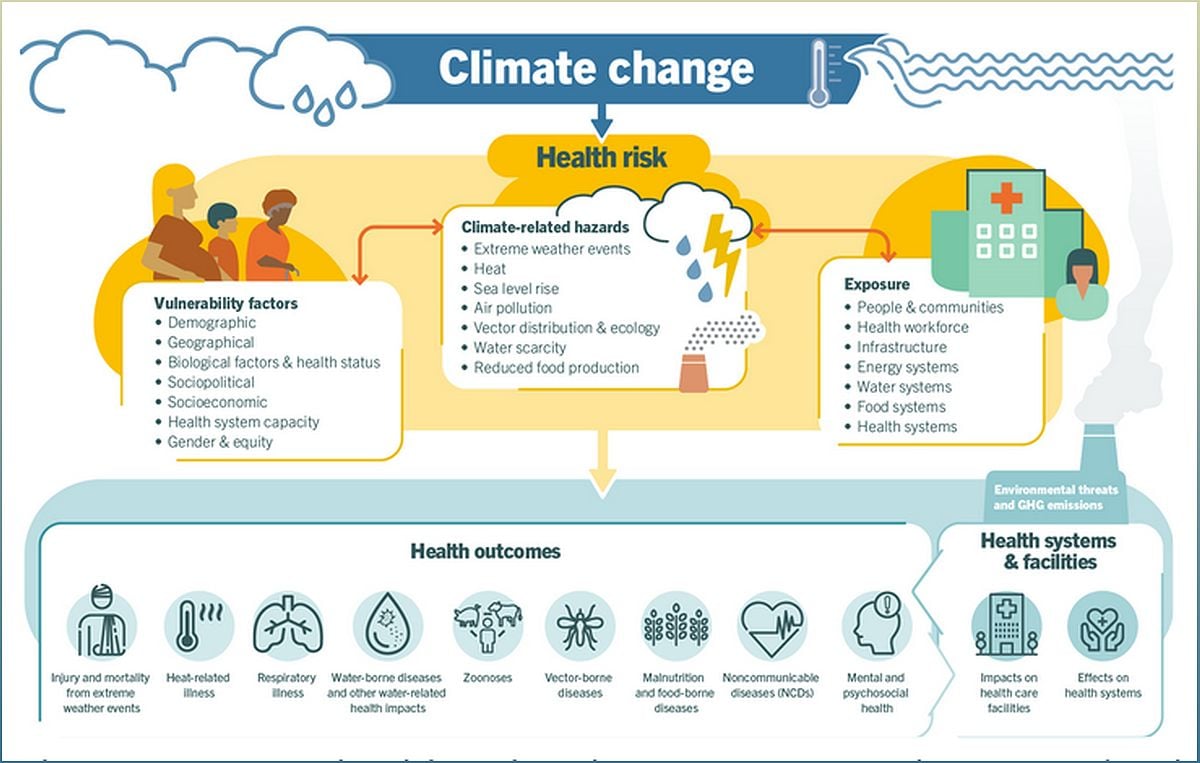The Link Between Climate and Health: Insights from COP28
Welcome to an insightful exploration of the intrinsic link between climate and health. In this article, we delve into the first implementation report of the Sharm El Sheikh Action Agenda (SAA) unveiled at COP28. This report sheds light on the profound impact of climate change on our health systems, emphasizing the urgent need for climate resilience in healthcare. Join me as we uncover the direct and indirect effects of climate change on human health and explore the transformative actions needed to address this pressing crisis.
Understanding the Sharm El Sheikh Action Agenda (SAA)
The Sharm El Sheikh Action Agenda (SAA) was launched at COP27 in 2022 as a comprehensive framework for global adaptation outcomes. Initially focused on five priority systems, it has since expanded to include health as a critical system, recognizing its interconnectedness with climate resilience. This section delves into the SAA’s origins, targets, and the increased emphasis on health in its implementation report.

By incorporating health as a key system, the SAA acknowledges the urgent need to address the impact of climate change on human well-being. It recognizes that climate-related events like heatwaves, storms, and floods have direct and indirect effects on health systems, exacerbating health issues and straining healthcare services. This subheading provides an overview of the SAA’s role in promoting climate resilience in healthcare and its significance in tackling the climate-health nexus.
The Urgent Crisis: Climate Change and Human Health
Climate change poses an urgent crisis to human health, with far-reaching consequences. This section explores the direct and indirect impacts of climate change on health systems and facilities. Increasing frequency and severity of weather events contribute to the escalation of climate-related health issues, mental health challenges, and strain on healthcare services. Vulnerable groups, such as women, children, and impoverished communities, are disproportionately affected.
Furthermore, the interconnectedness between health and other systems is evident. Climatic shifts disrupt agriculture and food security, escalate waterborne diseases, and pressure infrastructure. This subheading highlights the need for a comprehensive and holistic approach in climate adaptation strategies, recognizing the interdependencies between health, agriculture, water, and infrastructure.
Transforming Agrifood Systems for Health and Climate Resilience
Our current agrifood systems face significant challenges due to climate change. Despite global overabundance of calories, millions suffer from chronic hunger and lack access to nutritious diets. This subheading emphasizes the need for a global shift towards sustainable, locally appropriate diets to promote health and reduce greenhouse gas emissions.
The EAT-Lancet Commission recommends a 1.5x increase in the consumption of fruits, vegetables, seeds, nuts, and legumes by 2030. This dietary shift, focusing on plant-based foods, not only benefits health but also contributes to building climate resilience. By aligning our agrifood systems with climate goals, we can create a more sustainable and nourishing future.
Addressing the Critical Underfunding in Climate and Health Initiatives
A critical challenge in addressing climate and health initiatives is the lack of sufficient finance. This subheading sheds light on the underfunding issue, particularly in low- and middle-income countries (LMICs), which face significant barriers in implementing national health and climate change plans.
The report emphasizes the need for a reevaluation and enhancement of international financial structures to better support climate change and health initiatives. Adequate funding is crucial to ensure the successful implementation of climate resilience strategies and the protection of vulnerable populations.
The Growing Recognition of Health in Climate Action
There is a growing recognition of the importance of health in climate action. This subheading highlights the increased representation of health in the Nationally Determined Contributions (NDCs) of UN member states, indicating a positive shift towards prioritizing health in climate change mitigation and adaptation efforts.
The inaugural Health thematic day at COP28 and the adoption of a Health impact system within the Sharm El Sheikh Action Agenda (SAA) exemplify the momentum in acknowledging the climate-health nexus. Key initiatives like the Alliance for Transformative Action on Climate and Health (ATACH) have been launched to support the implementation of health commitments made at COP26.
Building Climate-Resilient Health Systems: A Call for Collaboration
Building climate-resilient health systems is crucial in ensuring the well-being of populations in the face of climate change. This subheading emphasizes the need for substantial financial investment, innovative surveillance systems for climate-sensitive diseases, and comprehensive action plans to protect communities from extreme heat.
Importantly, addressing climate change in the context of health requires collaboration across sectors. Recognizing the interconnections between health, environment, social, and economic systems is essential in developing effective climate adaptation strategies. Together, we can build a resilient future that safeguards the health and well-being of all.
